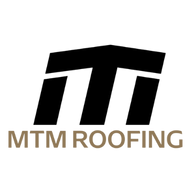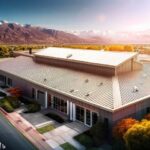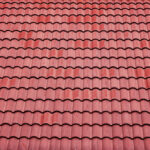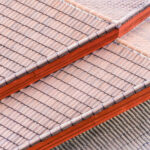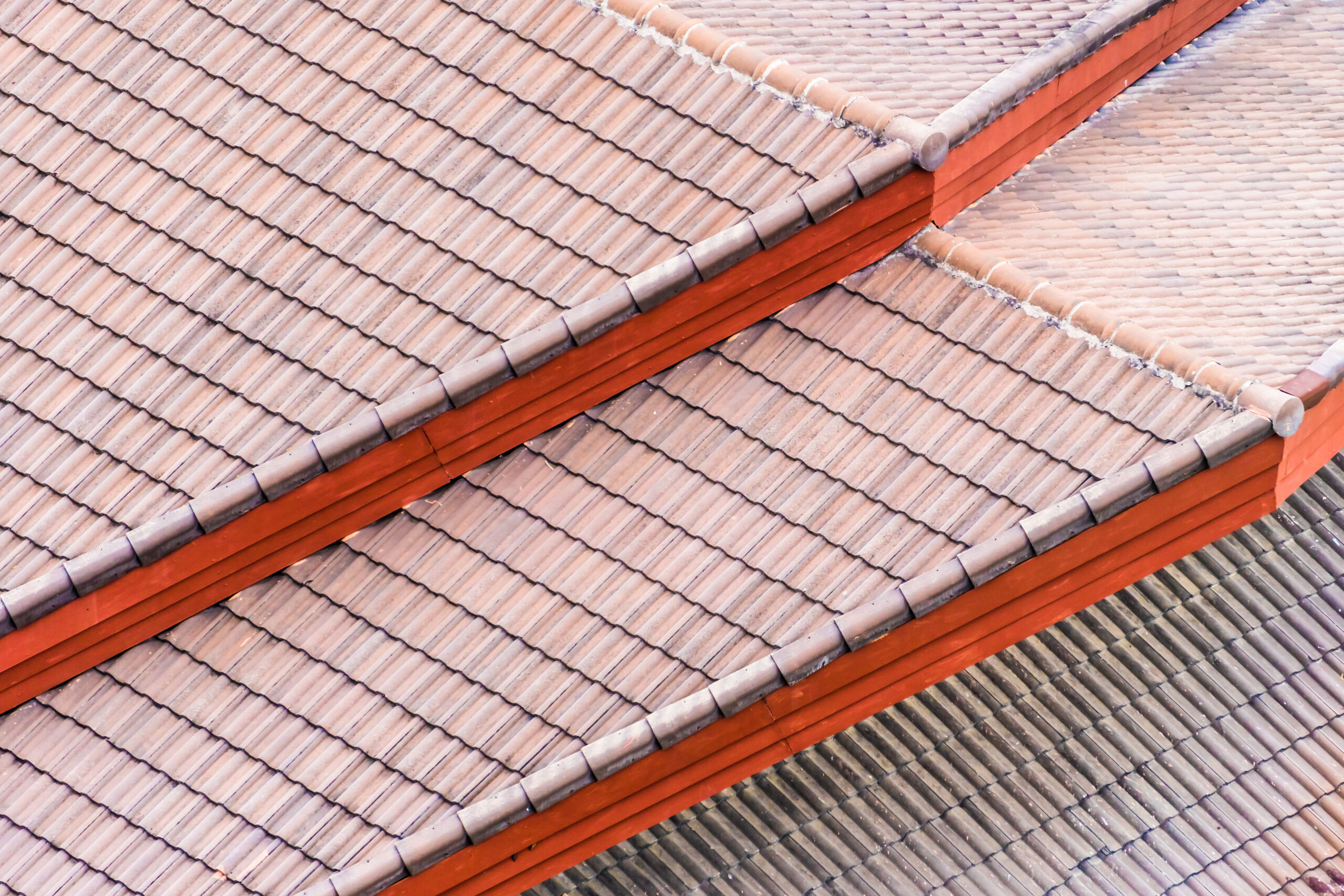When it comes to installing or replacing a new roof on your commercial building, choosing the proper roofing style is a crucial decision since the materials you choose have an influence on the building’s energy efficiency. Working with a reputable commercial roofing contractor is the best way to ensure that your new roof meets your building’s specs and aesthetics. Unfortunately, choosing the wrong roof may result in years of frustration and costly repairs, so it’s critical to work with a skilled commercial roofing specialist to guide you through getting the best roofing material for your property. In this article, you’ll learn about the 7 commercial building roof types and what factors to consider when selecting your commercial roof.
1. Spray Foam
Similar to metal roofs, the density of the foam determines the life expectancy of this commercial roof type. Spray foam industrial roofing systems could also last longer with regular coating maintenance.
Spray foam roofing is easy to install and energy-efficient, but it requires certain weather conditions to be installed, making it challenging to locate an optimal time for installation. A spray foam commercial roof should last for at least 50 years.
When deciding on the ideal commercial roof type for your buildings, our commercial experts recommend keeping in mind the lifetime of your investment and the cost of installation and upkeep. While some solutions may appear more cost-efficient initially, it’s critical to evaluate how long the roof will last and how often you’d like to renew your commercial roofing materials.
2. TPO Roofing Systems
TPO (thermoplastic polyolefin) meets all of the requirements for commercial roofing. This single-ply roofing system provides an effective barrier against weather elements such as precipitation, heat, UV, and wind.
The adjustable roofing layer is easy to install and protects refrigeration, heating, ventilation, and plumbing equipment. It can be changed to different thermal settings, keeping your building warm in colder climes. It also helps to cut long-term utility spending.
TPO is a new technology that has been shown to be tough and durable. However, most manufacturers are still building TPO models using faulty materials. This reduces the roofing membrane’s quality, increasing the chances of product failure. While progress is being made, predicting how long the system is likely to last is difficult.
3. Metal Roofs
Metal roofs can be light in weight, easy to install, and come in various finishes and colors. They have a low pitch and are especially suitable when vandalism-resistant roof coatings are required. To match the surrounding roof designs, you can create three types of metal roof tiling, sheeting, or cladding materials.
Standing seam designs, which have elevated seams and concealed fasteners, are flexible and adapt well to curved roofs. Prefabricated composite panels with two connected metal skins provide a quick and low-maintenance option.
Twin skins are identical to single skins, except they are constructed on-site and consist of two layers of metal sheets divided by a metal spacer grid. This enables an extremely tough, lengthy lifespan of up to 25 years. Metal roofs provide three long-lasting options to meet a variety of architectural requirements.
4. Green Roofing
Green roofs are often regarded as one of the most adaptable types of commercial roofing available today. They have been fashionable recently, but they are a long-term alternative for commercial properties and enterprises.
Green roofing solutions provide the greatest advantage of protecting commercial buildings from the weather while controlling water, drainage, and boosting energy efficiency. They are visually appealing and represent a significant step toward a more sustainable, ecologically friendly commercial property.
5. EPDM Roofing Systems
EPDM (Ethylene Propylene Diene Terpolymer) is a highly durable synthetic roofing membrane. This material is not only stronger and more flexible than traditional roofing options, but it is also often less costly.
EPDM is made of oil- and gas-based materials and is designed to withstand weathering. It is simple to install and may be used on flat and inclined surfaces. A single strip of thick rubber can be put over various constructions. And, because there are fewer seams, it will not degrade areas of the roof during installation.
Only skilled contractors should use EPDM systems. If the membrane is not properly bonded, it will reveal more of the building’s weaknesses. This can cause the roof deck to shrink, the paint to chip, and the building’s structure to be compromised.
6. Modified Bitumen Roofing
Reinforced roof textiles, like BUR membranes, are used as “carriers” for bitumen and are cut and fitted in layers. These two-ply roofing systems stick to the roofing deck for optimal stability and protection when attached to commercial rooftops.
Modified bitumen roof care generally consists of annual inspections and repairs. They also have higher tensile strength than most other flat roof designs that see heavy foot traffic. That implies that modified bitumen may be the best choice if you anticipate a lot of activity on your commercial building’s roof.
7. Flat Roofing Systems
If your structure is exposed to adverse weather, a flat roofing system is a better alternative. This commercial building’s construction is designed to resist years of high winds, torrential rains, and hail. Flat roofs can easily cover an entire commercial building’s square footage. These commercial roofing designs are easy to maintain. Contractors will have easier access to do periodic maintenance on your HVAC system while inspecting a flat roof.
Unfortunately, installation is not an easy job. The procedure necessitates meticulous preparation and prompt execution. If a flat roof is placed poorly, expect issues such as early repairs and water drainage.
If the system is not tightly sealed, it becomes easier to pierce the surface. Check that the design complies with all building standards before erecting the roof. Examine all construction codes and ensure the system is built using high-quality materials.
5 Things to Consider When Selecting a Commercial Roof
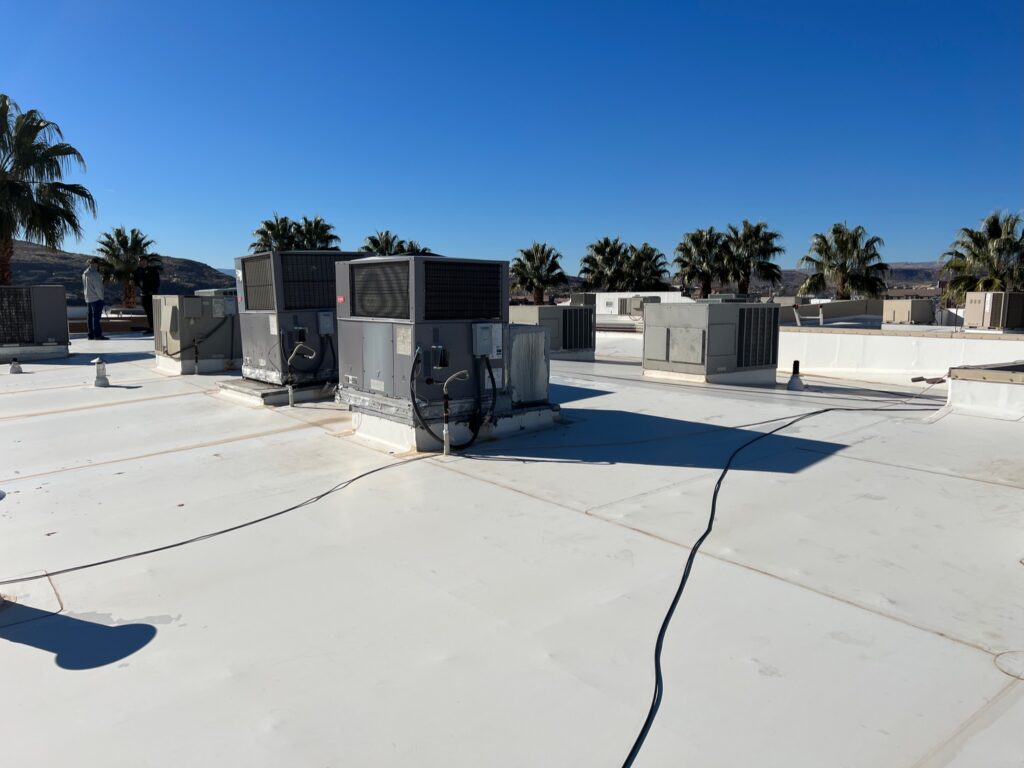
1. Installation and Maintenance Costs
The costs of commercial flat roof maintenance, replacement, or repair vary per structure and are influenced by several factors. Since commercial structures are often larger and have a lower slope than residential dwellings, the necessity for a roof varies. Choosing the proper material can have an impact on the total cost.
Before you buy a new roof, take the time to analyze the benefits and costs of various While some may be less expensive initially, others might endure for decades and could even pay for themselves through energy savings. Some may cost less initially, but others may last for decades and save so much energy that they pay for themselves.
2. Building Material
The materials to consider when selecting a business roof may vary depending on the construction of your building, climatic conditions, and foot traffic. Some popular commercial building roofing types include traditional membranes and metal roofing. PVC is a great choice for commercial roofing, although it is more costly than other materials.
Consider a breathable, waterproof, and flexible material if your firm is in a hot climate. If your business is in an area with significant snowfall or wind speeds, consider a reflective or metal system. If you’re constructing in a humid region, choose a flexible material like EPDM.
Ethylene propylene diene monomer, or EPDM, is a synthetic rubber that’s inexpensive and simple. The disadvantage of this kind of roof is that it will only last 10 to 15 years, so plan accordingly.
3. Roofing Contractors
When selecting a commercial roofing system, several aspects must be addressed, including design, location, and building code requirements. Other considerations include the construction, the materials utilized, and the actual structure of the building. A flat roof repair firm should also take into account the direction and shade provided by nearby trees.
There are various factors to consider, such as the time a job will take. Roofing contractors should also carry insurance in case of a lawsuit. It’s important to think about inflation as well as possible shortages of labor and materials, and finance costs. If you’re unsure how much money you have to spend, get estimates from different firms to get an idea of how much it will cost.
4. Your Future Plans and Needs
A business building’s roofing system should be chosen with future plans in mind. The types of roofs for commercial buildings, for example, are determined by consumer expectations, future goals, and your company’s demands. Some materials, such as mastic asphalt, have a lifespan of up to 50 years, whereas others have a shorter duration. A commercial roof repair firm should be able to achieve these requirements while being cost-effective.
5. Environmental Impact
The future of commercial property is centered around environmentally sensitive capabilities. Top-tier roofing ideas incorporating enough ventilation and insulation to boost energy efficiency are one approach to doing this. Furthermore, a green commercial roofing system uses recycled materials, can be recycled at the end of its life, can accept solar panels, or has reflective features.
Choosing the Right Roof for Your Commercial Building
As you can see, there’s a lot to consider when buying a new gutter or roof system. A building’s roof and gutter system safeguard and prolong its life. When choosing a new roof or gutter, it is critical to consider durability, design, and materials, among other aspects. You can find the best option for your firm with careful consideration and patience.
Finding the proper roof for your commercial organization should not be difficult. When you engage MTM Roofing, our professionals will assist you in determining the right roofing material for your individual needs. You can be confident that your commercial property will get outstanding roofing services and warranties. Contact MTM Roofing for a complimentary, no-pressure, professional estimate today!
